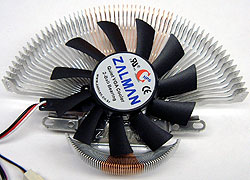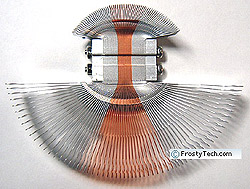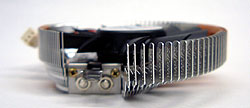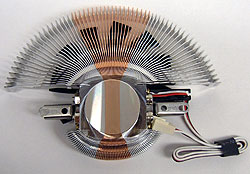360° View - Zalman
VF700-AlCu VGA Heatsink
Information on
Frostytech's test methodology is available
here. | |
|
 |
The
Heatsink Fan:
The eleven bladed
impeller on this 15mm thick 80mm fan
creates a moderate amount of airflow through thE cooling fins very quietly. The
fan can be connected to 12V DC or 5V DC via the 3-pin multi-connector
power connector which is supplied by Zalman. This allows the fan to spin
at either 1350RPM or 2650RPM depending on user preference. Power comes via a standard 3-pin motherboard
fan header which supports RPM monitoring. When installed, the Zalman
VF700-AlCu VGA heatsink will occupy one additional PCI slot worth of space adjacent
to the videocard. |
 |
Heatsink Top:
With the 80mm fan removed from
the Zalman VF700-AlCu we have a clear look at how the heatsink has been built
from individual strips of copper and aluminum. The copper fins are ~45mm on
the long side, ~15mm on the short. Because the heatsink cooling fins are built slightly off-center to
the base, exhaust airflow blows down onto the VGA memory which is located adjacent
to the GPU. |
 |
Heatsink Side A:
The copper fins
are spaced 2.0mm apart along the outer edge, and stand ~23mm high. The
entire VF700-AlCu heatsink is 30mm tall. Each copper/aluminum fin measures 0.3mm thick.
|
 |
Heatsink Side B:
The base which attaches to the GPU
is about
9mm thick at the center. In this picture you can see the two
bolts which run through the VF700-AlCu heatsink and hold it together. |
 |
Heatsink Side C:
The bottom fin pitch is much more
closely spaced, perhaps 0.5mm at most. The edges of the fins are all flat
right angles, so air will have a
more difficult time passing through such close spaces. In fact, we'd suspect that airflow is
more likely to just circumvent this set of cooling fins altogether. |
 |
Heatsink Base:
The base of the VF700-AlCu VGA heatsink is 30mm in diameter. This size base should
cover the vast majority of GPU's on the market, from both the nVidia and ATI
stables. The machined surface finish is razor flat and very smooth. Surface roughness is at
or better than ~8 microinches, which is excellent.
|


